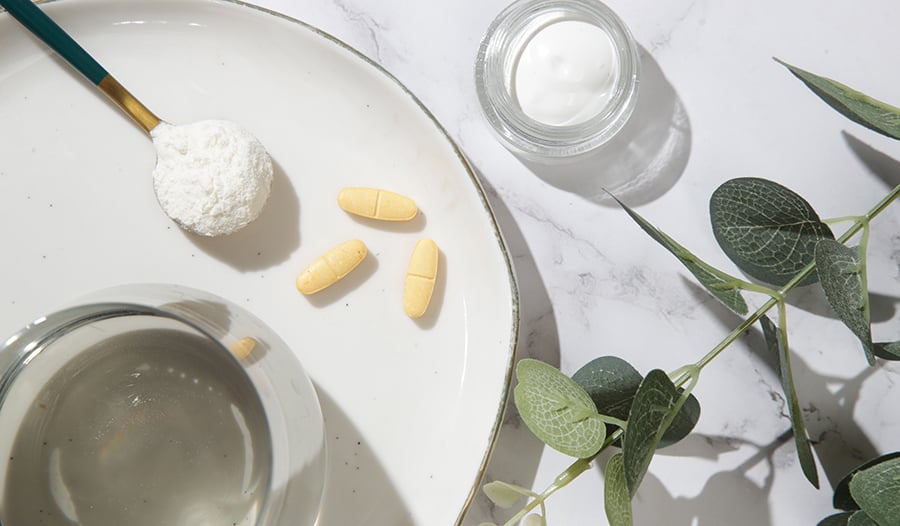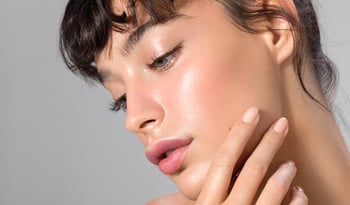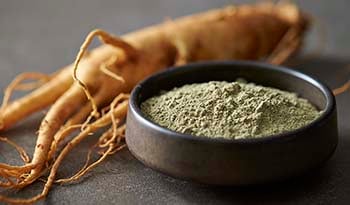6 Skincare Supplements for Maintaining Smooth and Youthful Skin
DISCLAIMER:This blog does not intend to provide diagnosis...
- In this article:
- How Does the Skin Change with Age?
- The Importance of Proper Nutrition for Healthy Skin
- The Best Supplements for Skin
- 1. Multivitamins Can Help Fill Nutritional Gaps
- 2. Flavonoids Support Collagen Levels
- 3. MSM Boosts Skin Strength
- 4. Collagen Supplements Benefit Skin Appearance
- 5. Silica Benefits Collagen and Elastin Production
- 6. Hyaluronic Acid Benefits Skin Hydration

Originally posted April 2017 / Updated August 2023
How Does the Skin Change with Age?
As we age, cumulative damage and the loss of the skin's connective tissue compounds cause the skin to change.
Damage to the skin is most often due to exposure to the elements—sun, wind, and pollution—and exposure to highly reactive molecules known as free radicals, including those produced in the body and consumed in the diet or environment.
Aging is also a significant factor in wrinkle formation. The connective tissue matrix is lost just below the skin's surface with aging. This matrix is responsible for maintaining tissue structure and water content. It is composed primarily of collagen, elastin, and hyaluronic acid.
The biggest reason for the loss in the connective tissue matrix with aging is reduced activity of the fibroblasts, the cells responsible for making collagen, elastin, and hyaluronic acid, which slows down. Although collagen gets much attention, much of the blame for skin looking old and wrinkled is due to decreased hyaluronic acid concentrations.
By age 70, most people will have lost approximately 80 percent of the hyaluronic acid in their skin. Hyaluronic acid helps the molecules of the connective tissue matrix "link arms" and form a cohesive structure. As a result of the loss in hyaluronic acid content, the collagen fibers become fewer and farther between. Hyaluronic acid is also critical in maintaining the water content in the skin.
The bottom line is that the skin becomes thinner, wrinkled, and weathered without sufficient connective tissue components, especially hyaluronic acid.
The Importance of Proper Nutrition for Healthy Skin
Eating a diet rich in antioxidants is important for keeping skin healthy. Do your best to avoid free radical exposure (excessive sun exposure, cigarette smoking, alcohol, etc.).
The best diet for healthy skin is the Mediterranean Diet. It has been well studied and associated with many health benefits and has the following characteristics:
- It centers on abundant plant food, including fruit, vegetables, bread, pasta, potatoes, beans, nuts, and seeds.
- Fish is consumed regularly.
- Red meat is consumed in small, infrequent amounts.
- Olive oil is the principal source of fat.
Olives and olive oil are critical components of the Mediterranean diet for skin health. Population-based studies have shown a higher intake of olives, and olive oil is associated with fewer wrinkles.
In addition to mono-unsaturated fat, olives and olive oil contain flavonoid compounds that effectively prevent free radical damage to the skin that can lead to wrinkle formation and protect the skin from other signs of damage.
In a traditional Asian diet, the same can be said for green tea and its chief polyphenol epigallocatechin gallate (EGCG). Green tea and green tea extracts have also shown an ability to protect against free radical damage to the skin, particularly damage caused by ultraviolet radiation.
The Best Supplements for Skin
1. Multivitamins Can Help Fill Nutritional Gaps
A high-potency multiple vitamin and mineral formula is also a key to healthy skin and boosting collagen production. Essential vitamins and minerals are part of the machinery in the fibroblast required to make collagen. Each day, you shed millions of skin cells, and as you slough them off, new cells rise to take their place. It would help to have all your essential nutrients for skin cells to form correctly.
One key nutrient to ensure your multivitamin includes is zinc as it is vital to skin cell and collagen manufacture.
2. Flavonoids Support Collagen Levels
Plant flavonoids are also critical in supporting healthy collagen levels. In general, flavonoids produce a potent and effective antioxidant activity against a broader range of oxidants.
This effect goes a long way in protecting collagen structures from damage. Blue or purple pigments are especially beneficial to collagen structures—specifically anthocyanidins and PCOs (short for proanthocyanidin oligomers)—found in grapes, blueberries, red kidney beans, and many other foods.
These flavonoids can also be found in pine bark and grape seed extracts. These two PCO sources have significant research and clinical studies showing their benefits in preventing and supporting aging skin. Anthocyanidins, PCOs, and other flavonoids affect collagen metabolism in many ways:
- They have the unique ability to crosslink collagen fibers, reinforcing the natural crosslinking of collagen.
- They prevent free radical damage with their potent antioxidant action.
- They inhibit the destruction of collagen structures due to inflammation.
- They help promote improved fibroblast activity in aging skin.
3. MSM Boosts Skin Strength
Sulfur is also an essential nutrient for the skin because it stabilizes collagen and other connective tissue matrix components. MSM (methyl-sulfonyl-methane) is a significant form of sulfur in the human body, and the sulfur-containing amino acids methionine and cysteine also play valuable roles.
For example, about a quarter of your collagen is made of cysteine (cysteine contains sulfur atoms), forming especially sticky bonds with collagen and other connective tissue proteins. Sulfur helps with the strength and water-binding potential of collagen. And that is important in helping skin remain supple and smooth. To ensure optimal sulfur levels, take 1,000 mg of MSM daily.
4. Collagen Supplements Benefit Skin Appearance
Collagen dietary supplements are derived from various sources, including the skin, bones, and connective tissues of cows, chickens, pigs, and fish. When denatured by heat, collagen forms gelatin, which has been used for centuries as a food source and in traditional medicine. So, in other words, gelatin is a source of collagen peptides. There is evidence that gelatin provides identical benefits to collagen peptides. Collagen sources are broken down more than gelatin to manufacture hydrolyzed collagen or collagen peptides. The advantage is that collagen peptides have higher water-solubility and no gelation properties, allowing them to be conveniently formulated into powdered mixes and hot and cold liquid drinks.
Gelatin and collagen peptides can provide valuable amino acids to the skin, hair, joints, and connective tissue. Collagen peptide supplements have been shown to help maintain skin elasticity and hydration, which may help minimize the appearance of skin aging and smooth out fine lines, especially if taken over six months.
5. Silica Benefits Collagen and Elastin Production
In addition to taking a collagen supplement, I recommend taking a fibroblast activator. In the body, the collagen factory in the skin is the fibroblast. One of the most exciting and well-documented approaches to increasing the manufacture of collagen is the use of a highly bioavailable form of silica (choline-stabilized orthosilicic acid or BioSil®). Initially, research focused on the ability of Biosil to increase the levels of hydroxyproline, the key amino acid required to produce collagen and elastin.
Clinical studies with choline-stabilized orthosilicic acid showed impressive results in women (ages 40 to 65 years) with signs of sun damage and premature skin aging. Those receiving 10 mg of Biosil daily experienced 30% improvements in shallow, fine lines and 55% increased skin elasticity, and significantly reduced brittle nails and hair.
6. Hyaluronic Acid Benefits Skin Hydration
Hyaluronic acid plays a key role in the skin's connective tissue matrix. When skin becomes damaged by free radicals, it gets inflamed, and the skin cells start producing less and less hyaluronic acid. This leads to wrinkle formation. And as mentioned earlier, your skin's hyaluronic acid content also naturally decreases with age.
Hyaluronic acid injections are used in medical spas to fill in wrinkles. However, taking hyaluronic acid supplements may be an alternative. For one thing, hyaluronic acid supplements may have a longer-lasting effect than injections. Hyaluronic acid supplements are more natural and offer a less invasive way to deliver this important compound into the skin.
Clinical studies have shown that hyaluronic supplements can significantly increase the skin's moisture content, dramatically improving the skin's appearance among dry and rough skin. The dosage used in the clinical trials was 120 mg daily; improvements are typically seen in 4 to 6 weeks of supplementation.
References:
- Purba MB, Kouris Blazos A, Wattanapenpaiboon N, et al. Skin wrinkling: can food make a difference?" J Am Coll Nutr 2001;20:71-80.
- Lecci RM, D'Antuono I, Cardinali A, Garbetta A, Linsalata V, Logrieco AF, Leone A. Antioxidant and Pro-Oxidant Capacities as Mechanisms of Photoprotection of Olive Polyphenols on UVA-Damaged Human Keratinocytes. Molecules. 2021 Apr 8;26(8):2153.
- Yusuf N, Irby C, Katiyar SK, Elmets CA. Photoprotective effects of green tea polyphenols. Photodermatol Photoimmunol Photomed. 2007 Feb;23(1):48-56.
- Farjadmand F, Karimpour-Razkenari E, Nabavi SM, et al. Plant Polyphenols: Natural and Potent UV-Protective Agents for the Prevention and Treatment of Skin Disorders. Mini Rev Med Chem. 2021;21(5):576-585.
- Lee JH, Park J, Shin DW. The Molecular Mechanism of Polyphenols with Anti-Aging Activity in Aged Human Dermal Fibroblasts. Molecules. 2022 Jul 7;27(14):4351.
- Pérez-Sánchez A, Barrajón-Catalán E, Herranz-López M, Micol V. Nutraceuticals for Skin Care: A Comprehensive Review of Human Clinical Studies. Nutrients. 2018 Mar 24;10(4):403.
- Kim DU, Chung HC, Choi J, Sakai Y, Lee BY. Oral Intake of Low-Molecular-Weight Collagen Peptide Improves Hydration, Elasticity, and Wrinkling in Human Skin: A Randomized, Double-Blind, Placebo-Controlled Study. Nutrients. 2018 Jun 26;10(7):826.
- Evans M, Lewis ED, Zakaria N, Pelipyagina T, Guthrie N. A randomized, triple-blind, placebo-controlled, parallel study to evaluate the efficacy of a freshwater marine collagen on skin wrinkles and elasticity. J Cosmet Dermatol. 2021 Mar;20(3):825-834.
- Inoue, N., Sugihara, F. and Wang, X. Ingestion of bioactive collagen hydrolysates enhance facial skin moisture and elasticity and reduce facial ageing signs in a randomised double-blind placebo-controlled clinical study. J. Sci. Food Agric. 2016;96: 4077–4081.
- Barel A, Calomme M, Timchenko A, et al. Effect of oral intake of choline-stabilized orthosilicic acid on skin, nails and hair in women with photodamaged skin. Arch Dermatol Res. 2005;297(4):147-153.
- Michelotti A, Cestone E, De Ponti I, et al. Oral intake of a new full-spectrum hyaluronan improves skin profilometry and ageing: a randomized, double-blind, placebo-controlled clinical trial. Eur J Dermatol. 2021 Dec 1;31(6):798-805.
- Sato T, Sakamoto W, Odanaka W, Yoshida K, Urushibata O. Clinical effects of hyaluronic acid diet for dry and rough skin. Aesthetic Dermatol 2002;12:109-20.

 By Dr. Michael Murray, N.D.
By Dr. Michael Murray, N.D. 


